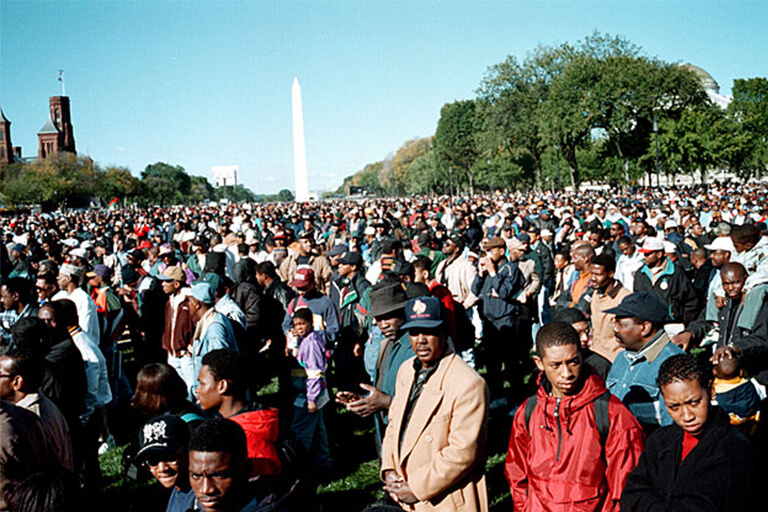Muslim Voices — Sinno

Audio transcript:
0:00:06:>>MANAF BASHIR: Welcome to Muslim voices. I'm your host Manaf Bashir. This week we'll see a historic election in the United States with Americans casting ballots for the first ever African American presidential candidates. Many see it as a chance for African Americans to break a glass ceiling of sorts. Another minority in the U.S. has had difficulty gaining political ground - Muslims. Although, two have been elected to U.S. Congress in recent years. And it is not just on the national stage where Muslims have had a rough time. They are an underrepresented group at all levels of government. That's just one issue explored in the book "Muslims In Western Politics." Editor Abdulkader Sinno seen or says the book grew out of a desire to help Western nations better understand their Muslim population. He spoke with Rosemary Pennington.
0:00:57:>>ABDULKADER SINNO: Those countries, after 9/11, had to deal with balancing security, and issues of civil rights and civil liberties. And they made different choices about how to do so. And nothing is less at stake here than the future of those Western liberal democracies and the future of the Muslim minorities who live within them. When the decisions go overboard in one direction or another, it might affect the constitutional bases of those Western democracies. And so those were essential issues. And we needed to bring together some of the best minds who think about those issues from different perspectives and different disciplines to think about what kind of compromises and what kind of decisions about how to deal with both security and civil rights must be made and to come up with policy recommendations. And I took it upon myself to bring those people together at IU and we produced that volume.
0:01:45:>>ROSEMARY PENNINGTON : There's a wide array of Western countries represented - the United States, Germany, Belgium, Canada - and all these countries have very varying experiences with Muslim minorities in their countries. Is there a common thread running through any of these countries and how they treat Muslim minorities?
0:02:03:>>ABDULKADER SINNO: There are some similarities but there are more differences than similarities. And that's how they can learn from each other and that was one of the goals why we did have this conference. We brought experts on Europe, and experts on Canada and experts on United States to compare those experiences. And the differences are more important than similarities. For example, some European countries - like the Netherlands or Belgium - have done much better than some others - like France or the United States - when it comes to the representation of Muslims in politics. And that means that whatever conflict that could be negotiated within said institutions as opposed to in the streets, like what happened in France when you had those riots, or through radicalization that happens elsewhere. While in the United States, we have done a much better job than in some - than most of those European countries when it comes to the socio-economical integration of Muslims. We don't have a glass ceiling here in professional life like they do in countries like France or Belgium where there's a lot of racism and discrimination in the labour market. So there's a lot of room for all countries to learn from each other and that comparative discussion really informs policy. And that's what we tried to do in this book.
0:03:08:>>ROSEMARY PENNINGTON : You write a chapter on Muslims in American politics. And your chapter is basically discussing the underrepresentation of Muslims, not only in national offices, but also working for political candidates and really at a local level as well. Why has it been that that Muslims have been so underrepresented in politics in this country?
0:03:29:>>ABDULKADER SINNO: There are a number of reasons. And some of them are internal to the Muslim community and some of them are from the political environment, which is pretty hostile towards Muslims participating in politics. Among Muslims themselves, while most Muslims are newer immigrants to the states and now we are having the second generation emerge as much more American that speaks without an accent, that can integrate much more easily, and become more active and assertive. And now it's making a big difference. A portion of that Muslim community is African American one and they are more active than the rest of them. But also there is a hostile environment particularly towards Muslim candidates and Muslims in any political role in government. And we see that coming from different pressure groups who see Muslims as being hostile, or as being not American enough, and who are very vocal about it and use, blatantly, their political muscle to demote any Muslim who has been appointed to committees in Capitol Hill, in Congress or even on advisory committees without much power. And also, attacks on Muslim candidates who run for politics. Many of those attacks are clearly Islamophobic, some of them are racist and they use stereotypes to denigrate the religion and ethnic background of the candidate. This has happened to Muslims at the time in our history, the United States, where it is not acceptable to any other group.
0:04:54:>>MANAF BASHIR: Abdulkader Sinno is assistant professor of Political Science and Middle Eastern studies at Indiana University. He's also the editor of the new book "Muslims In Western Politics." This has been Muslim Voices, a production of voices and visions in partnership with WFIU public media from Indiana University. Support for Muslim Voices comes from the Social Science Research Council. You can subscribe to our podcast on iTunes or join the discussion on our website. Find us online at MuslimVoices.org.


 IU Global
IU Global